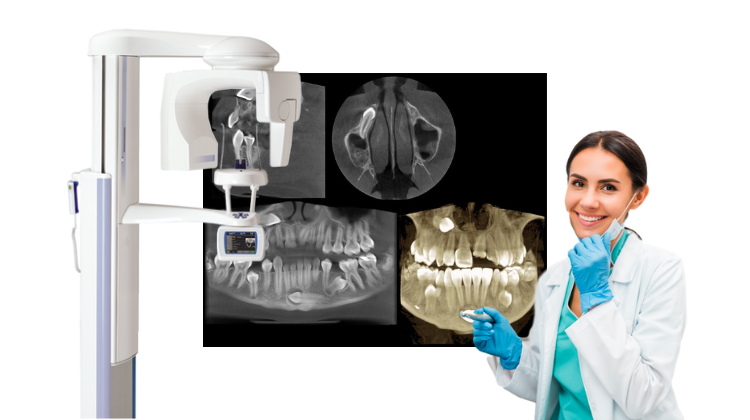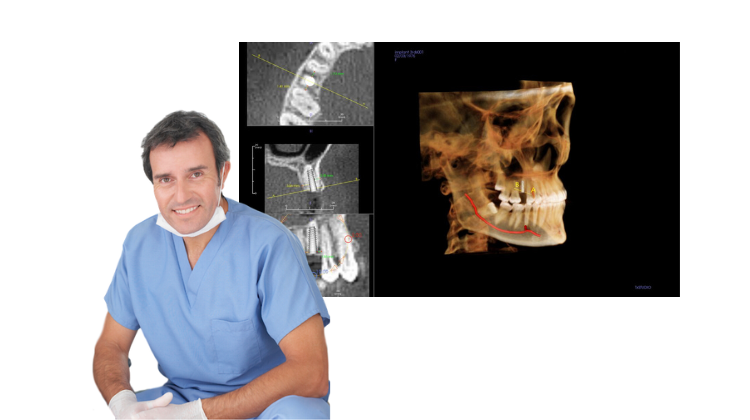Accounting for Regulatory Considerations with the Purchase of a Dental CBCT Machine

At Renew Digital, some of the recurring concerns we hear from customers considering the purchase of a dental CBCT machine are in regards to compliance with state regulations. Dentists and dental specialists interested in upgrading their 2D panoramic X-ray systems have consistently asked us what they should do to comply with state regulatory agencies when undergoing a 3D upgrade. Here are a few top considerations.
State Approved Dental CBCT Sales and Service
Many states regulate the sale, installation, and service of dental CBCT machines, requiring vendors, installation, and service suppliers to be registered with the state to conduct business. If you are considering adding a dental cone beam system to your practice, you may be able to obtain a list of approved service companies or technicians through the state X-ray regulation agency or department website or by contacting the state directly. Check your state website for a directory or contact the state regulatory authority by phone or email with your request.
While most large dealers and service providers will be registered pursuant to state laws, some smaller entities, especially those out of state, may not be. Prior to working with any service provider, ensure they have received the required state credentials to minimize risk to your practice, your staff, and your patients. Renew Digital, as a leading supplier of certified pre-owned panoramic X-ray, cephalometric X-ray, and CBCT machines throughout the United States, is registered to sell, install and service dental CBCT scan systems in all required jurisdictions.
Shielding Plan Approval
There are some states that require that a Shielding Plan be performed by a Qualified Expert (QE) prior to the installation of a dental cone beam system (and some 2D panoramic and/or cephalometric X-ray machines, as well). A Qualified Expert (QE) is typically a physicist or other professional approved by the state to perform Shielding Plans.
To perform the Shielding Plan, the QE will typically review the physical space where the CBCT machine is to be located and then calculate the amount of radiation that will be generated and possibly scattered within the X-ray area as well as adjacent areas based on the equipment settings and the projected number of scans. The QE will then develop a Shielding Plan which will properly orient the unit within the current space while making recommendations for improvements or alterations to the setting based on state regulations.
Typically, the QE will then submit final copies of the Shielding Plan to the practice, state, and the installer. In some states, it is necessary not only to obtain a Shielding Plan prior to installation but state approval for the plan, as well. Make sure you are familiar with your state’s Shielding Plan protocol and approval timeline prior to installing a dental CBCT machine in your practice.
If a Shielding Plan is required, and a practice fails to receive or submit one (in accordance with state law) both the practice and the installation company may be charged with violations and subjected to fines and/or other penalties.
As an industry leader, Renew Digital works with both local and national physicists and regulatory companies to help our customers create and submit Shielding Plans when required by state law. We also provide our customers with dedicated project managers that will help our customers complete all the required forms and guide them through every step of the process.
Construction
Occasionally, your state’s regulations (or your Shielding Plan) may require you to install additional sheetrock or lead to the walls of the imaging area that can absorb or block radiation scatter to the adjacent areas. This can improve both patient and dental practice staff safety.
Sometimes viewing windows or mirrors must be added in order to allow for patient viewing during CBCT scans. Additional construction considerations may also be required to accommodate the wiring of components, cables, power outlets, computers, capture stations, reconstruction computers, and other devices. It’s also possible that the size of the room may need to be adjusted prior to purchasing a dental CBCT system if the room is too small for staff and patients, especially for those with disabilities, to access and operate the equipment.
If you decide to purchase a certified pre-owned dental CBCT machine through Renew Digital, your project coordinator will complete a 3D CAD drawing of your dental imaging space, with the “new” system in it, marking outlets, capture stations, wiring, shielding, and other considerations, streamlining planning and installation.
Training
Both patient positioning and image capture can be significantly different with CBCT machines than with 2D panoramic systems; 3D imaging software also tends to be much more robust.
Therefore, when you upgrade to a CBCT machine, both you and your staff may need additional training to shorten the learning curve. Your Renew Digital technician will show you and your staff how to position patients and capture scans to obtain the highest image quality. The technician will also walk you through the operation of the machine and software.
After installation, you may choose to pursue additional training from an accredited third party or reach out to Renew Digital for additional training resources.
Post Installation and/or EPE
Some states require that dental practices obtain a post-installation survey and/or Equipment Performance Evaluation (EPE) after the installation of a CBCT machine. Post-installation surveys are usually conducted by Qualified Experts, measuring the amount of radiation in and around the machine imaging room. Post-installation surveys are performed to ensure that patients and staff are not exposed to unacceptable limits of radiation scatter.
An Equipment Performance Evaluation report requires that the CBCT machine be tested to verify that its output meets manufacturer specifications for patient and operator safety. The requirements for post-installation surveys or EPEs may vary by state; be sure to research your state’s regulations to determine if and how frequently they are required to ensure your practice remains compliant.
Though Renew Digital cannot perform post-installation surveys, our technicians are trained to perform EPEs in required states, using specialized equipment and devices to perform these tests and analyze results.
Quality Assurance (QA) Programs
Some states require that practices implement stringent QA (quality assurance) programs to ensure that CBCT machines within their jurisdictions are working as intended. Most states simply require the operator to follow manufacturer protocols, but some states have established their own guidelines and requirements for QA procedures.
Dental and dental specialty practices must research and observe all state-required QA protocols to ensure that they and their staff are following them in accordance with both manufacturer and state guidelines.
QA programs are taken very seriously in most states and failure to observe them can result in violations, notices and fines. Document all your QA tests clearly and keep them in a secure location in case you ever need to produce them for an inspection.
If you purchased a cone beam CT machine from Renew Digital, you can contact Renew Digital support for assistance with running QA processes.
Dosimetry Badges
You should also make sure to check with your state regulatory agency to verify whether a dosimetry badge will be required after the installation of your CBCT machine.
Designed to protect dental professionals and their staff from excess radiation exposure, dosimetry badges are tags worn by staff that measure how much radiation they have received. They should be closely monitored for spikes and anomalies, which should be reported and addressed immediately.
Machine Registration
Some states require CBCT machine registration; some before installation, others afterward. All states use different forms and processes to register X-ray machines in their jurisdictions. Be sure to contact your Renew Digital Project Coordinator or Regulatory Officer to ensure you’re following the proper protocol and submitting the requisite forms for your specific dental X-ray machine and/or modality.
In addition to machine registration, some states also require the dental office to register with the state independently of the equipment. Improper registration can also result in violations and steep fines.
Inspections
During the process of purchasing and installing a CBCT machine, you’ll want to ensure you’re observing all applicable rules and regulations so that you and your practice are ready for a scheduled or unscheduled state inspection after installation. Make sure you complete and file all paperwork during the process, including FDA 2579 forms received from the installer, State X-ray Registration Forms, Shielding Design Plans, Equipment Surveys, EPEs, Quality Assurance Results, Written Safety Policies, and any other completed forms or paperwork. Be sure you also keep copies of service and maintenance records throughout ownership of the device(s) so you can produce them upon request during an inspection.
Before your first and subsequent inspections, you should also be sure to have the proper safety and operational signage posted near the machine, and that you have updated your dental practice safety protocols and process documents in accordance with dental cone beam-specific instructions.
To help you better prepare for a state inspection, check your state’s X-ray regulations website for inspection details and frequencies. Many states post an inspection checklist to assist with compliance so you know what to expect and can prepare for the inspection accordingly. You can also contact compliance agencies in your state or region that may be able to help prepare you for an inspection for a small fee.
Contact Renew Digital

Although this article covers several of the important regulatory considerations you will want to make prior to the purchase of a dental CBCT machine, it is not a complete or exhaustive list. We strongly recommend you consult your state regulatory agency to ensure that you are prepared for compliance before you purchase a CBCT machine.
Dental CBCT machines are subject to specific regulatory requirements and require additional thought and planning to ensure compliance with all measures. Working with a respected company like Renew Digital can help you avoid regulatory pitfalls during purchase and installation.
Best of all, you can save up to 50% off the new list price of a CBCT machine when you purchase used dental equipment through Renew Digital! The purchase of a certified pre-owned dental cone beam ct machine includes the latest 3D imaging software and includes installation, training, and comprehensive warranty coverage, including parts and on-site service.
Contact Renew Digital for more information on adding a dental ct scanner to your practice. You can reach our team online or by calling 888-246-5611. Our helpful sales team will be happy to answer your questions and help you find the perfect digital dental X-ray machine for the unique needs of your practice.



